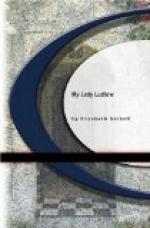But even to Harry Mr. Horner was silent. Still, it was pleasant to find himself in many ways so readily understood; to perceive that the crumbs of knowledge he let fall were picked up by his little follower, and hoarded like gold that here was one to hate the persons and things whom Mr. Horner coldly disliked, and to reverence and admire all those for whom he had any regard. Mr. Horner had never had a child, and unconsciously, I suppose, something of the paternal feeling had begun to develop itself in him towards Harry Gregson. I heard one or two things from different people, which have always made me fancy that Mr. Horner secretly and almost unconsciously hoped that Harry Gregson might be trained so as to be first his clerk, and next his assistant, and finally his successor in his stewardship to the Hanbury estates.
Harry’s disgrace with my lady, in consequence of his reading the letter, was a deeper blow to Mr. Horner than his quiet manner would ever have led any one to suppose, or than Lady Ludlow ever dreamed of inflicting, I am sure.
Probably Harry had a short, stern rebuke from Mr. Horner at the time, for his manner was always hard even to those he cared for the most. But Harry’s love was not to be daunted or quelled by a few sharp words. I dare say, from what I heard of them afterwards, that Harry accompanied Mr. Horner in his walk over the farm the very day of the rebuke; his presence apparently unnoticed by the agent, by whom his absence would have been painfully felt nevertheless. That was the way of it, as I have been told. Mr. Horner never bade Harry go with him; never thanked him for going, or being at his heels ready to run on any errands, straight as the crow flies to his point, and back to heel in as short a time as possible. Yet, if Harry were away, Mr. Horner never inquired the reason from any of the men who might be supposed to know whether he was detained by his father, or otherwise engaged; he never asked Harry himself where he had been. But Miss Galindo said that those labourers who knew Mr. Horner well, told her that he was always more quick-eyed to shortcomings, more savage-like in fault-finding, on those days when the lad was absent.
Miss Galindo, indeed, was my great authority for most of the village news which I heard. She it was who gave me the particulars of poor Harry’s accident.
“You see, my dear,” she said, “the little poacher has taken some unaccountable fancy to my master.” (This was the name by which Miss Galindo always spoke of Mr. Horner to me, ever since she had been, as she called it, appointed his clerk.)




